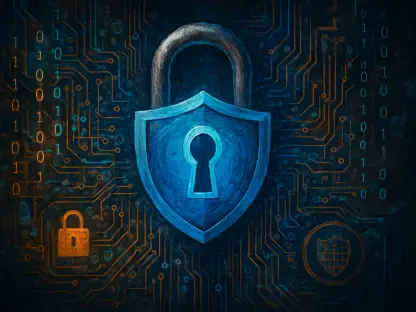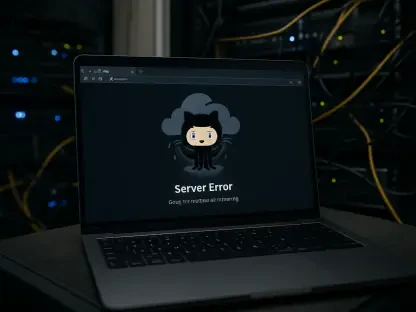The increasing reliance on technology in our daily lives has significantly heightened our exposure to cyber risks, demanding an urgent and collective international action to combat these threats. Richard Horne, CEO of the U.K.’s National Cyber Security Centre (NCSC), emphasized the importance of improving global resilience against increasingly sophisticated and aggressive cyber threats at the Singapore International Cyber Week. Horne pointed out that as societies become more entwined with technology, the complexity and frequency of significant cyber incidents have surged, highlighting a 50 percent increase in nationally significant incidents and a threefold rise in severe attacks in 2024 compared to the previous year. This alarming trend necessitates coordinated global efforts to enhance cyber resilience by integrating security measures into technology from its developmental stage and ensuring both public and private sectors are prepared for efficient recovery from cyber-attacks.
Complexity and Frequency of Cyber Incidents
Cyber threats are not limited to nation-states but have expanded to include a wider range of actors, further complicating the threat landscape. Horne advocated for international collaborations, citing the critical need for collective efforts to tackle these cyber threats effectively. One such significant collaborative effort is the Counter Ransomware Initiative, which has been instrumental in making progress against ransomware attacks. This initiative has seen the endorsement of guidelines for organizations on ransomware payments by 39 nations and eight international insurance bodies. This cooperation serves as a testament to the substantial progress that can be achieved through global collaboration. By sharing insights and resources, countries and organizations can develop a more robust defense mechanism against cyber threats, leveraging each other’s strengths and expertise.
The statistics presented by Horne underscore the urgency of the situation, with a notable rise in severe cyber-attacks. These incidents have shown that the current cyber defense mechanisms are often outpaced by the rapidly evolving nature of cyber threats. To address this disparity, there is a need for a proactive approach that involves the integration of security measures into the very fabric of technological development. This approach should also include preparing both public and private sectors to respond swiftly and efficiently in the event of an attack. By doing so, the impact of cyber incidents can be mitigated, and systems can be restored to normalcy more quickly, reducing the overall damage caused by such attacks.
The Role of Global Collaboration
The expansion of cyber capabilities beyond nation-states underscores the importance of global collaboration in tackling cyber threats. Individual countries alone may struggle to combat these sophisticated attacks, but through international cooperation, a more formidable defense can be established. Horne highlighted several recent international efforts that illustrate the significance of working together to address cyber threats. For instance, the guidelines for ransomware payments endorsed by multiple nations and insurance bodies demonstrate how global collaboration can lead to better, more unified responses to cyber challenges. By setting common standards and sharing best practices, nations can collectively enhance their cyber defenses and reduce the effectiveness of cybercriminal activities.
Moreover, Horne stressed the need for long-term technology resilience, urging developers to adopt a lifecycle management approach. This means ensuring that new technologies remain secure against future threats by continuously updating and maintaining them over time. Without proper management, today’s innovations could become tomorrow’s vulnerable legacy systems, posing significant risks to cybersecurity. By fostering a culture of continuous improvement and vigilance, developers and organizations can build more resilient systems that can withstand the evolving landscape of cyber threats. This commitment to long-term resilience is crucial in maintaining robust cybersecurity defenses.
Promoting Innovative Cyber Defense Methods
In line with the aim of enhancing national and international cyber defense, the NCSC has invited organizations to contribute insights into cyber deception as part of its long-term research goals. This initiative aligns with NCSC’s broader efforts to advance cybersecurity through collaboration and knowledge-sharing. Cyber deception involves creating false targets and misleading information to confuse and deter cyber attackers, making it harder for them to achieve their malicious objectives. By involving various organizations in this research, the NCSC aims to develop new and innovative methods to bolster cyber defenses and make it more challenging for adversaries to succeed.
Horne’s statements reflect a consensus on the urgency for global cooperation, advanced planning, and integrated security in technology development. Governments play a critical role in guiding and supporting these initiatives, setting the tone for robust and resilient cyber defenses. By championing international cooperation and fostering an environment where public and private sectors can work together, nations can build stronger defenses against cyber threats. The shared knowledge and resources resulting from such collaborations can lead to more effective strategies and technologies, ultimately contributing to a safer and more secure digital world.
Conclusion
The growing cyber capabilities beyond just nation-states signify the crucial need for global collaboration in addressing cyber threats. Individual countries may find it difficult to counter these sophisticated attacks alone, but through international cooperation, a stronger defense can be built. Horne pointed to several recent international initiatives that demonstrate the importance of working together on cyber threats. For instance, guidelines for ransomware payments backed by multiple nations and insurance agencies show how global collaboration can lead to more unified responses to cyber challenges. By establishing common standards and sharing best practices, countries can collectively improve their cyber defenses and diminish cybercriminal activities.
Furthermore, Horne emphasized the necessity of long-term technology resilience, urging developers to adopt a lifecycle management approach. This involves ensuring new technologies remain secure against future threats by continuously updating and maintaining them over time. Without proper management, current innovations could turn into tomorrow’s vulnerable legacy systems, posing significant cybersecurity risks. By fostering a culture of continuous improvement and vigilance, developers and organizations can create more resilient systems. This long-term resilience is key to maintaining strong cybersecurity defenses.









